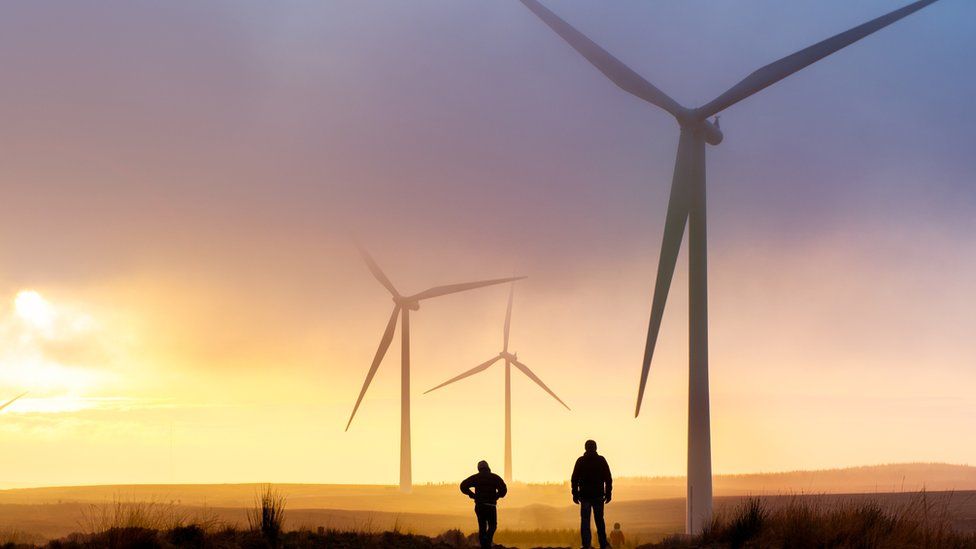ARTICLE AD BOX
 Image source, Getty Images
Image source, Getty Images
By Theo Leggett & Mark Poynting
BBC News
To help tackle climate change, the UK has pledged to reach "net zero" - where no further planet-warming greenhouse gases are added to the atmosphere - by 2050.
To achieve this, much less energy needs to be generated by fossil fuels and much more needs to come from renewable sources and low-carbon technologies.
Experts say increasing the use of renewables would also improve the UK's energy security.
How is the UK's energy produced?
Energy is used for various purposes, including heating and powering homes, businesses, transport and industry.
In 2022, the majority of the energy used within the UK - 79.1% - came from fossil fuels such as coal, oil and gas.
This is down from 87.2% in 2012, mainly due to the declining use of the dirtiest fossil fuel, coal.
Around one-fifth, or 20.1%, of UK energy use was from "low-carbon" sources in 2022 which is up from 12% in 2012.
"Low-carbon" includes renewables such as wind, solar, hydropower and bioenergy and nuclear.
Nuclear is not considered renewable, but is classed as low-carbon because power stations do not directly release greenhouse gases during their operation.
The output from nuclear energy has actually fallen by around a third in the past decade due to ageing reactors.
How does the UK produce its electricity?
Electricity generation accounted for around a third of the UK's total energy use in 2022.
Of the electricity generated in the UK in 2022:
- 40.8% came from fossil fuels
- 56% from low-carbon sources - including 41.4% from renewables and 14.6% from nuclear
By comparison, of electricity generated in 2012:
- 67.6% came from fossil fuels
- 30.7% came from low-carbon sources, including 11.3% from renewables and 19.3% from nuclear.
In particular, power generation from coal has fallen sharply, although natural gas usage remains high.
The use of both wind and solar power has increased rapidly.
In the first three months of 2023, for instance, for the first time wind generated more electricity than gas.
How can the UK reduce carbon emissions from energy?
To meet the UK's legally-binding target to be "net zero" across the economy by 2050, the government has said that all electricity should be generated from "clean" sources by 2035.
Remaining non-electric energy use will have to be net zero by 2050.
Since electricity can be generated by low-carbon sources rather than fossil fuels, demand for it is expected to grow by 40-60% by 2035.
Ensuring electricity is generated as cleanly as possible will therefore be increasingly important to meet the overall net zero goal.
The government has announced various ambitious targets to decarbonise energy and electricity.
These include increasing the capacity of offshore wind, nuclear, carbon capture and hydrogen, all of which are low-carbon technologies.
It is also encouraging people to use electric heat pumps instead of gas boilers, and will ban the sale of new petrol and diesel cars from 2030.
Is the government doing enough?
Recent reports by the government's independent climate advisers the Climate Change Committee (CCC), the National Audit Office and a cross-party group of MPs have all warned that the UK risks missing its 2035 "clean" electricity target without increased effort from Whitehall.
Key recommendations include:
- reducing natural gas usage more quickly
- improving homes' energy efficiency
- changing planning laws to speed up renewable projects
- reforming the electricity grid to pass on the cheaper running costs of renewables to consumers
Where does the UK get its energy from?
In 2022, the UK imported about 37% of its energy.
That represents a drop from nearly 50% in the early 2010s, but the figure is still higher than in the late 1990s, when the UK was a net exporter - meaning it sent more energy abroad than it imported.
The UK imports proportionally less of its electricity - typically about 5%. In 2022 it was a net electricity exporter for the first time in 44 years, but this was largely because of French nuclear plant maintenance.
What about energy security?
The importance of energy security was highlighted when Russia's invasion of Ukraine disrupted the gas market.
The reduction in Russian supplies increased demand for other countries' gas resources, causing global prices to soar, and pushing up consumer bills.
Image source, Getty Images
Image caption,Russia significantly reduced the amount of gas sent to Europe through its Nord Stream 2 pipeline
North Sea oil and gas production has been declining rapidly in recent years. In an effort to slow that trend, the government has confirmed it will award 100 new licences for oil and gas exploration. Hundreds more are expected to follow.
It argues that this will "secure our domestic energy supply and reduce reliance on hostile states".
While opening up new wells could boost production for a while, it would have limited benefits - as a large proportion of reserves in the North Sea have already been used up.
The International Energy Agency and other bodies warn that any new oil and gas projects would go against existing commitments designed to avoid the most harmful impacts of climate change.
The CCC and environmental think tanks Green Alliance and the Energy and Climate Intelligence Unit argue that the best way to lower bills for customers and boost energy security would be to cut fossil fuel use.
This is not least because North Sea supplies are dwindling, and gas from any licences granted for new exploration projects would not enter the market until around 2050.
By contrast, they say a decarbonised electricity system would be more reliable, secure and cost-effective by protecting the UK from volatility in fossil fuel prices.

 1 year ago
28
1 year ago
28








 English (US) ·
English (US) ·